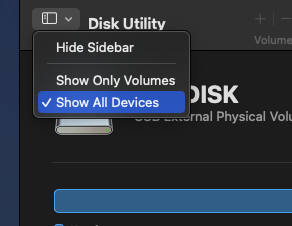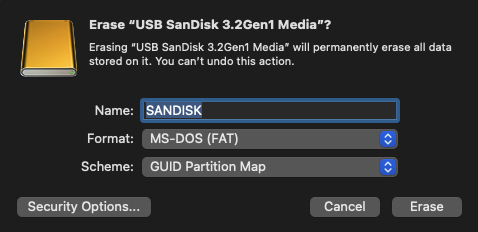No edit summary |
No edit summary |
||
| Line 8: | Line 8: | ||
# Select the USB drive (the root item, not the single partition) from the left sidebar and make sure it shows up in the right pane.[[File:Device select.png|none|frame]] | # Select the USB drive (the root item, not the single partition) from the left sidebar and make sure it shows up in the right pane.[[File:Device select.png|none|frame]] | ||
# Click Erase from the top toolbar. | # Click Erase from the top toolbar. | ||
# Enter any name, set the format to MS-DOS (FAT), and set the scheme to GUID Partition Map. | # Enter any name, set the format to MS-DOS (FAT), and set the scheme to GUID Partition Map.[[File:Erase options.png|none|frame]] | ||
# Click Erase. | |||
For more information, see the [https://support.apple.com/guide/disk-utility/erase-and-reformat-a-storage-device-dskutl14079/mac Disk Utility User Guide]. | For more information, see the [https://support.apple.com/guide/disk-utility/erase-and-reformat-a-storage-device-dskutl14079/mac Disk Utility User Guide]. | ||
== Ubuntu == | == Ubuntu == | ||
Revision as of 10:48, 25 September 2023
Windows
macOS
- Back up anything currently on the flash drive as the entire drive will be erased.
- Open Disk Utility from Launchpad or /Applications/Utilities.
- Click View > Show All Devices.
- Select the USB drive (the root item, not the single partition) from the left sidebar and make sure it shows up in the right pane.
- Click Erase from the top toolbar.
- Enter any name, set the format to MS-DOS (FAT), and set the scheme to GUID Partition Map.
- Click Erase.
For more information, see the Disk Utility User Guide.


